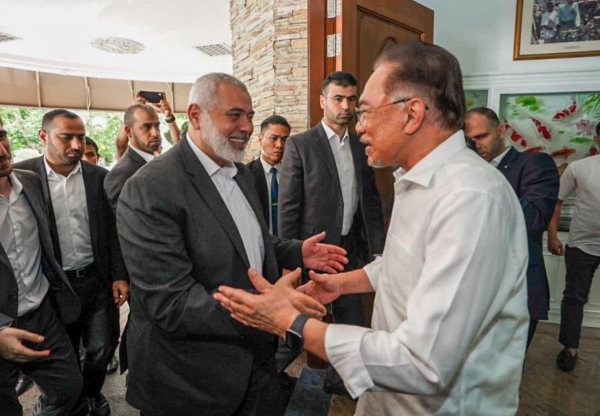Malaysia’s Prime Minister Anwar Ibrahim will depart tomorrow for Saudi Arabia, where he says he will add his country’s weight behind calls for a swift end to Israel’s bombardment of Gaza.
International opinion has rapidly polarized following the deadly October 7 incursion by militant group Hamas into southern Israel, which saw the militant group kill more than 1,000 people. The Israeli Defense Force has responded by launching air assaults on the Gaza Strip that have killed hundreds of Palestinian civilians, drawing sharp condemnations, especially in the Muslim world.
Anwar’s trip to Riyadh was planned prior to the Hamas attacks – its nominal purpose is for a summit between the Association of Southeast Asian Nations (ASEAN) and the Gulf Cooperation Council – but it comes amid growing diplomatic friction over the Israel-Hamas war.
Addressing Malaysia’s Parliament on Monday, when it convened for a special session to address the Gaza crisis, Anwar said that he would take the opportunity to discuss the issue “with friends of ours such as the UAE, Qatar, Egypt and Turkey.” He added, “Nevertheless, something must be done immediately.”
Diplomat Brief
Weekly Newsletter
Get briefed on the story of the week, and developing stories to watch across the Asia-Pacific.
Get the Newsletter
In his address to Parliament, which he delivered wearing a Palestinian scarf draped over his shoulders, Anwar said that his government was resisting Western pressure to denounce Hamas. “I said that we, as a policy, have a relationship with Hamas from before and this will continue,” Anwar told parliament on Monday, Reuters reported. “As such, we don’t agree with their pressuring attitude, as Hamas too won in Gaza freely through elections and Gazans chose them to lead.”
The same day, Anwar held a call with Ismail Haniyeh, the head of Hamas’ political bureau, during which he expressed Malaysia’s unwavering support for the Palestinian people. In a Facebook post, the Malaysian leader stressed that the onus was on Israel to “abandon their adherence to the politics of dispossession,” broker an immediate ceasefire with Hamas, and “genuinely pursue a peaceful resolution to end the ongoing conflict.”
“It is crucial and paramount to prioritize the well-being and safety of all individuals affected by this crisis,” Anwar added.
Anwar’s stance reflects Malaysia’s longstanding, and largely bipartisan, support for the Palestinian cause, and its refusal to establish diplomatic relations with Israel. This has also been reflected since the Hamas attacks on October 7, during which time anti-Israel sentiments have been simmering. Mosques have held special prayers for Gaza and pro-Palestine rallies have been organized in various parts of the country, including one in Kuala Lumpur last weekend, which was attended by politicians from both sides of Malaysian politics, including non-Muslim leaders.
Advertisement
The Ministry of Education has also announced its withdrawal from this year’s Frankfurt Book Fair, the world’s largest trade fair for books, accusing the organizers of taking a pro-Israel stance.
Such sentiments are also broadly shared among the public at large. TheVibes.com, a Malaysian news site, published an editorial this week that praised Anwar for his pro-Palestinian advocacy. “The country’s consistent stance is a testament to its unwavering commitment to justice, self-determination, and human rights,” it stated.
If Malaysia’s advocacy of the Palestinian cause puts it out of step with its main Western partners, which have rallied to Israel’s side since the gruesome attacks of October 7, this is doubly true of its longstanding relationship with Hamas.
Over the past decade, senior Hamas officials have made a string of visits to Malaysia, often enjoying audiences with the country’s prime ministers. In 2013, Prime Minister Najib Razak even paid a return visit to Gaza, then under an Israeli blockade, in order “to express [his] solidarity with the Palestinian people.” When Anwar was appointed prime minister last November, the group’s Ismail Haniyeh sent him a message of congratulations.
“Relations between Hamas and Malaysia have accelerated in recent years in an unmistakable way,” one analyst observed in 2019. The analyst added that the Malaysian government’s hosting of Hamas delegations “reflects a clear recognition of its role and activities as a legitimate resistance group.”
As I’ve mentioned before, Kuala Lumpur’s stance stems from the fact that the Palestinian cause enjoys broad support among the Malay Muslim majority, making it politically imperative that the country’s governments maintain their support.
As Arab nations have gradually normalized their relations with Israel over the past five years under the Washington-brokered Abraham Accords, Malaysia, and its fellow Muslim-majority neighbors Indonesia and Brunei, have become increasingly important sources of support for the Palestinian cause. Whether they are able to exercise any significant impact on the situation inside Gaza or the West Bank, however, remains for the moment unclear.
